Queen Nirine Venramoir
Queen Nirine Venramoir (a.k.a. The Beloved)
Do you take me for a fool, my dear? You sound like you do. But don't worry, I shall let that slide this one time.
You see, sweetheart, I could care less what you think of my appearance or my position. Despite do you like it or not, my dear count, I am your queen. And as long as I sit on this throne, you and your foolish huffs and puffs won't make me flinch an inch.
Since the first king Vasandor Ralonsalor I, many kings and later emperors have left their mark on Islenor. Yet among the male rulers is one woman that has and keeps capturing people's imagination. Depending on your point of view, Nirine Venramoir was either second or only queen to ever rule over Kingdom of Islenor and her life has become something of a legend.
Even if the culture has kept going to the increasingly patriarchal direction to counter-act matriarchy of drows, stories about Queen Nirine persist, and her legacy is much respected. It could well be that without stories of her and some other famous ladies of the past, islenorian view of women might have become even more restrictive than it can be today.
Mental characteristics
Personal history
Nirine's life has inspired several legends. As she lived so long ago, the time has distorted some of these tales. But as far as the historians have been able to gather, her career was thriving and from the start, very unique.
Promise from gods
Story of Nirine Venramoir starts 2nd of Jun, in year 6751 in AoP (1854 TbS). Her birth itself is part of a legend, told from her father, Luzeiros Venramoir.
Back in the day, the line of the first monarchs of Islenor, the Ralonsalor, had started to go sour; after the great kings each generation had slowly turn more undesirable than the next, until in time of king Leolar Ralonsalor his people rebelled. Both nobles and commoners alike were torn in the fierce civil war. On the rebels' side, people started to rally behind paladin of Angharradh, Luzeiros Venramoir, younger brother of a nobleman. Luzeiros hadn't exactly expected such interest towards him, but took his position with duty and honoured people's will.
As clashes between king and rebels got bloodier, Luzeiros started to question his cause. His beloved wife, Aleria, whom's council he had always trusted, was with a child and fallen ill. Luzeiros felt compelled to stay with her instead of continuing a war that had cost so many lives. Before a great battle, Luzeiros prayed for the gods of The Seldarine, asking their advice if he could continue his pursuit of the throne.
And so, the King to be got to his knees, exhausted, closing himself to the shrine. For entire night he would pray; he prayed Angharradh, he would plead Corellon Larethian, he would call for Labelas Enoreth, he would call all the gods and goddesses of The Seldarine, looking for an answer.
How to put an end to the tyrant?
Would it all be worth it?And as dawn was near, he still prayed, his knees bloody from crawling in front of the gods, as he asked them to bless his wife and unborn child.
The next day, he got an answer to his prays as his troops had a decisive victory in the battlefield that turned the tide of the war for good. As they stepped back to rest before battles to come, Luzeiros heard his wife was giving birth and rushed to her. Aleria had started to feel better, and would fully recover from her difficult pregnancy, and in her arms was a baby girl, they're firstborn, that sealed for the couple that this was indeed the will of the gods. They decided to name the girl after a flower, that in islenorian culture stands for change and resilience, and named her Nirine.
On her bosom the babe would rest;
her pale white cheek against her chest.
Among the locks red so fine,
single curl like snow, pure white.Tears would flow on warrior's cheek
he raised her daughter, their eyes would meet;
"I promise you, love, I bring you the stars,
flourish my flower, bring glory to the Gods
Luzeiros Venramoir would become king of Islenor later that year, and he had a prosperous reign. However, unlike most monarchs of Islenor, he wasn't concerned about having a son but started to train his beloved daughter to become the next monarch. He viewed that the occurrence of Nirine's birth meant that she was destined to become the queen, and as such, he never even attempted to replace her as his rightful heir. While much more religiously minded would agree with this sentiment, others were more sceptical.
Islenor had only once ever been ruled by a woman before, and that was in the time of Cailynn Ralonsalor. Queen Cailynn only ruled for a short period as a substitute for her brother until he was of age. Many considered that women were unfit to rule a kingdom, and would end up corrupted by the power. Despite this, Luzeiros never viewed this as an issue and continued to educate his firstborn daughter to become a just and fair ruler.
Nirine married at the age of 134 with Yelric Eremil, the second son of his family, through matrilineal marriage. The event happened in the capital during the winter months.
Crowning of the Queen
In the 30th of Aug, year 6977 in AoP (1628 TbS) Luzeiros Venramoir passed away after a long period of sickness and rapid visions of past lives. After the funeral on the 2nd of Sep, it was the coronation of 226-year-old Nirine, and she became the ruler of Islenor. While many, if for nothing else than the sense of duty, bend the knee before the fresh queen, others were more reluctant. Not only that, besides local unrest, close by kingdoms had taken an interest in the new queen's rule.
For the first decade in her rule, Nirine's court had to reply to several small rebellions as well as outside threats. To everyone's surprise, though, the elven queen did not fall.
Man turned to look at his queen in disbelieve. The discomfort was there in her eyes, but so was determination. She wasn't going to bend; she was going to rule. Her sweetness was hidden away behind the mask of duty, and her voice loud and clear she told her decision:
"As for your crimes against the crown, you shall be executed. Your lands are given to your sons if they bend their knees and swear allegiance to my name. If they don't, they will follow after you to the Arvandor."
She would turn to see the executioner. With a small, elegant nod, she gave her mark. And it was done.
According to historical sources, queen Nirine was well educated, very charming, and pleasant to talk to, lady-like and courteous at first glance. This behaviour often deceived those who did not know her better to think of her as fragile or easy to best, but this was soon proved to be a myth. Queen Nirine was indeed the well-behaving lady who had a preference for diplomatic solutions, but she also had a quite a temperament when angered, and she was able to be sly when required.
As the conflicts first arouse, her first responses were meek and apologetic, but soon enough, the fresh queen would get tired of fooling around. During that first ten years, there were several beheadings, crushing fights, and humiliations which, while not executed in the most optimal fashion, sent the message loud and clear: Nirine Venramoir was someone you should take seriously. They also pretty much proved that Nirine should not be in charge of military confrontations, something she later gladly left to her generals.
"They had their reasons to be afraid you know. I mean, you have seen how Lloth works through women. They had never seen a woman in power like this. It reminded them too much of matriarchs of the drow, so they were afraid."
Nirine's first years on power concerned the populous, yet after the uprisings would calm down, it was time for the queen to show what she could do.
The Queen's Road
At age of 237, Nirine gave birth to her first child. Princess Ileleste was born on the 10th of Jul, year 6988, in the AoP (1617 TbS). Simultaneously, the queen had put in action a great building project, a road that would go through her whole kingdom. After years of hostilities, the roads of the kingdom were in bad shape, and the queen considered fixing this as her priority to ease the life of her people and promote travel and trade. This surprisingly practical decision from the queen baffled many, yet would be the first big improvement queen would do for the lives of her subjects.
Queen Nirine was not a warlord but proved to be a capable diplomat and pragmatic thinker, as well as a great lover of arts, literature, science, and holding festivities. As an elegant and fashionable woman, the queen was easily considered vain right after stepping to power.
This view of her complicated her first years of rule, but her actions would speak louder than her garments as time went by. Queen would often hold charity events, build new temples, and renovate public places to serve their purpose better. She would personally ride and talk to lords that served her to discuss any disagreements, instead of sending councillors to do so. She also offered funding for several expeditions and different kinds of projects to support her kingdom's growth.
"Queen Nirine had this almost motherly attitude towards ruling. She wasn't afraid to punish those that worked against her, but she also had this deep sense of duty in her. If there were something to be done, she would make sure it would get done, and she wasn't afraid to ask for help. I think people respected her from that."
..."No task was too small, boring, or mundane. She (Nirine) wasn't afraid that she would need to do something flashy to get people's attention. If there was something wrong and it was affecting her people, it was queen Nirine's business, that is how she saw it."
Nirine's first and only son Nantashal was born on the 15th of Mayol, year 7034 AoP (1571 TbS). She would later give birth to two more daughters, Neriqirelle (7085 AoP) and Tristhana (7104 AoP). For an elven woman, she had a lot of children and seemed to enjoy motherhood. Queen and her husband, Yelric, seemed to enjoy a relatively good marriage at least on a superficial level.
It was year 7 108 in AoP (1 497 TbS) when Nirine would end up making her most influential decision during her reign. It was brought to the queen's attention several times that local academics had a hard time sharing and acquiring information or research partners outside of their field. Laws, regulations, and common practices of academic circles discouraged sharing research in fear of plagiarism and losing credibility, which was causing a lot of problems. Queen would call her advisors to discuss the issue and passed new regulations. Queen also funded a great library that she filled with research papers, books and other materials she bought from different academics and opened the library as a place of study, and later as school knows as "The Royal Academy of Tel'Taurn Tal".
This is, of course, was the Royal Academy of Knowledge of Tel'Taurn Tal. During her reign, it would grow and in the hands of future kings, and then emperors academy became the most prestigious academic- and research community of the known world. Today it spans hundreds if not thousands of research centres, and side offices around the Empire and outside of its borders.
"I don't think anyone knows at this point what would have happened if queen Nirine wouldn't have built that first library. It's wild to imagine how something that sounds small can change the whole future of science and arcane research forever."
Stepping down and passing on
To queen's great sorrow, her son Nantashal Venramoir died during drow raid while visiting the countryside in year 7333 AoP (1272 TbS). Nantashal's son, Rolanin, became the heir to the throne. Queen Nirine stepped down from power in 7 449 AoP (1156 TbS) but stayed part of her grandson's small council until she passed on in 7493 AoP (1112 TbS). Even in her old days, people described her as a majestic and impressive woman who would always work for her people's good.
Gender Identity
Sexuality
Social
Family Ties
Relationships
Achievements
- Managed to hold power despite all suspicion towards her
- Renovation and building projects for good of her nation
- Supporting and re-imagining the science community of her nation
- Building diplomatic relations
- Building the Glass Palace
- Establishing several new trade relations
- Winning over love and admiration of her people to generations to come
Tel'Taurn Tal
The Glass Palace
Before queen Nirine's reign, king's seat in Tel'Taurn Tal stood in Stag's Watch castle. Nirine, however, found Stag's Watch insufficient to its current task. Expanding Stag's Watch had been talked about on several occasions, but so far, these plans had never been put to action.
Tel'Taurn Tal had grown since the building of Stag's Watch and now included the highest point of the hill the city stands on. Nirine ordered to level the previously lone hilltop and bought the properties next to it. The new palace was built directly on top of this hill so that the whole city could be viewed from its towers.
During the building process, it became apparent that such a large structure would cause heavy shadows on the city, and Nirine was not pleased with this. With her court mages, they devised the plan, that included placing reflecting crystals onto the walls of the palace towers, and infusing them with illusory magic. In this way, the structure would appear as see-through, only its silhouette appearing to the sky, but not blocking the sun. Structure, now know as Glass Palace has since become most recognizable landmark of Tel'Taurn Tal.
As the light glimmered through the tower; it was hard to do anything else but stare at them. "Tel'taurn Tal Disease" they called it. You could tell who was there for their first time by how many times they would turn to see the palace towers and stare, sometimes hours on end. But you can't blame them; those towers sure are pretty.
On her command, they also renovated the Stag's Watch castle and on these days is used as a headquarters if city guard and host some important events, but all later royalty of Islenor have resided in the Glass Palace.
Feminine and unapologetic about it
Historians have tried to pinpoint what made queen Nirine so popular, and kept her in popularity even after her passing, making her muse for storytellers to come. One suggested attribute of the queen that might have the key to this has been speculated to be her relationship to her femininity. Historians speculate that the example of her father - paladin for a Goddess no less - stilled to the young princess the idea of gender equality, but also the appreciation of the differences of men and women, which would later blossom to her life philosophy.
Nirine was never ashamed to show her feminine side or defend it in any way to fit among the men, nor she felt the need to speak ill about masculinity. This trap seems to be something many women in power have dropped into, but queen Nirine managed to dodge it gracefully. This talent with words added to her wittiness and made sure any of her remarks didn't look cheap as they were never about a thing a person couldn't impact on themselves. When added to her graceful way to show humility when she had made a mistake, the fact that she would never apologize for being a woman made her seem endearing and woke respect.


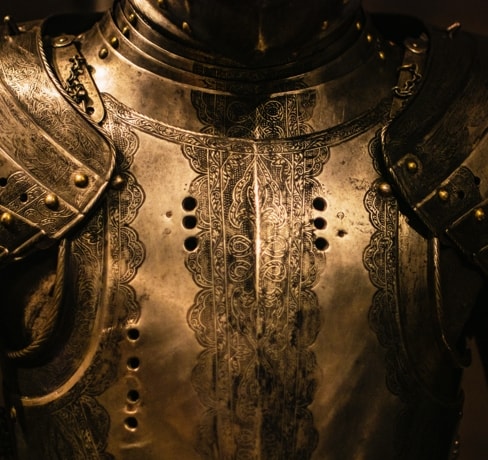
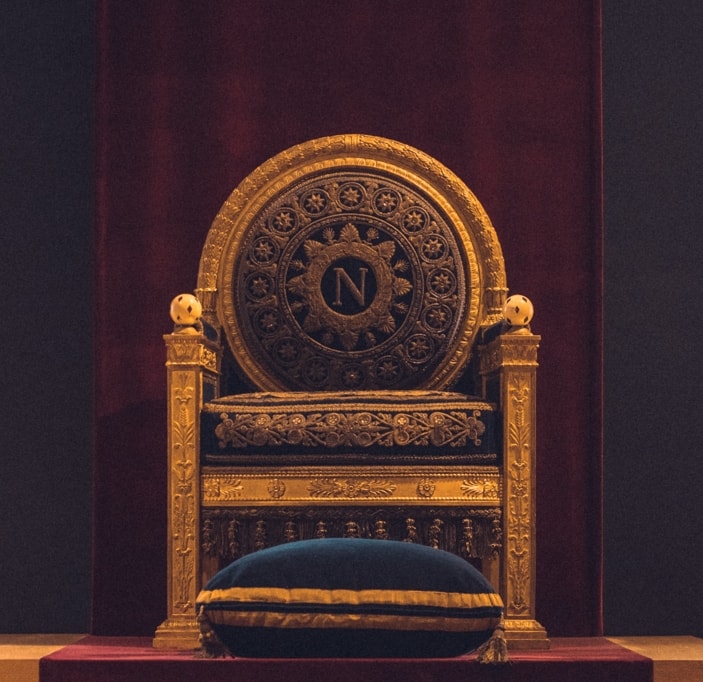



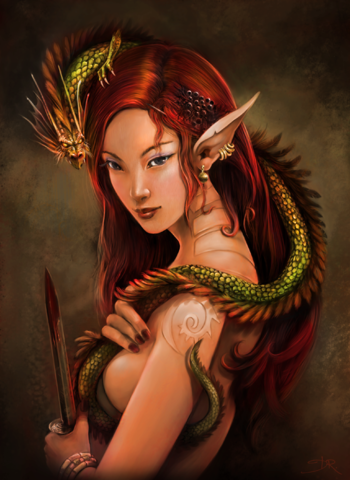


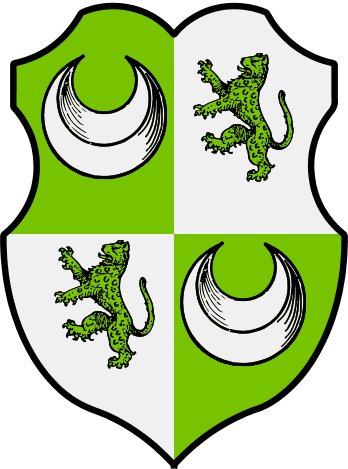
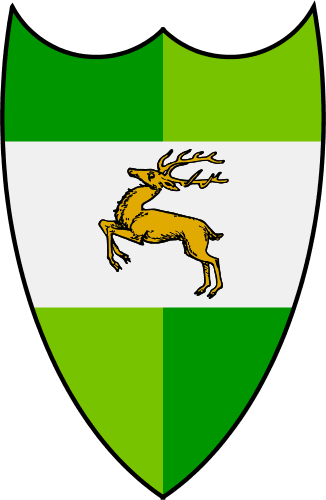
Comments
Author's Notes
This article was created as an entry for World Anvil's Summer Camp 2019 event. Sometimes it's easier to get things done when there is an event involved! You can view all my entries to the event here, or check out Summer Camp 2019!